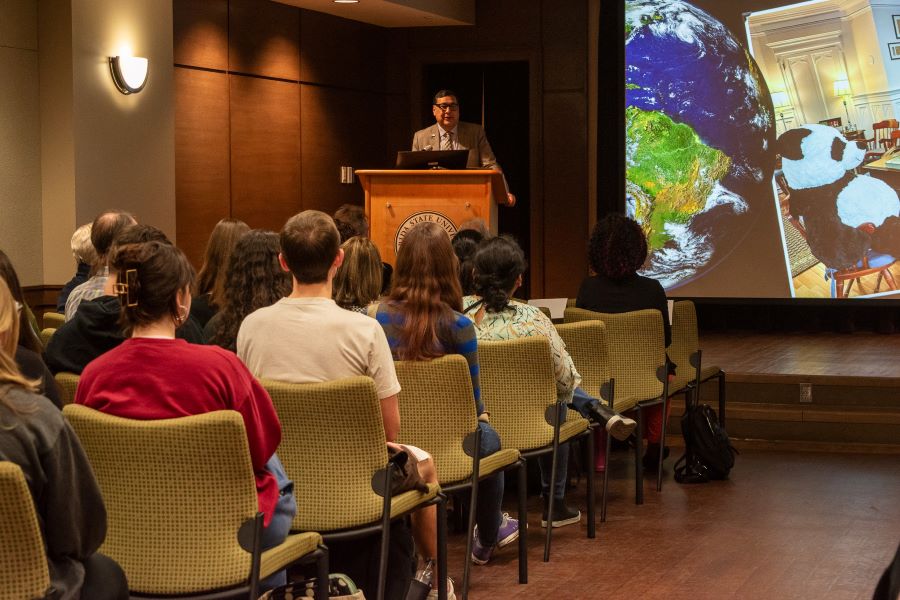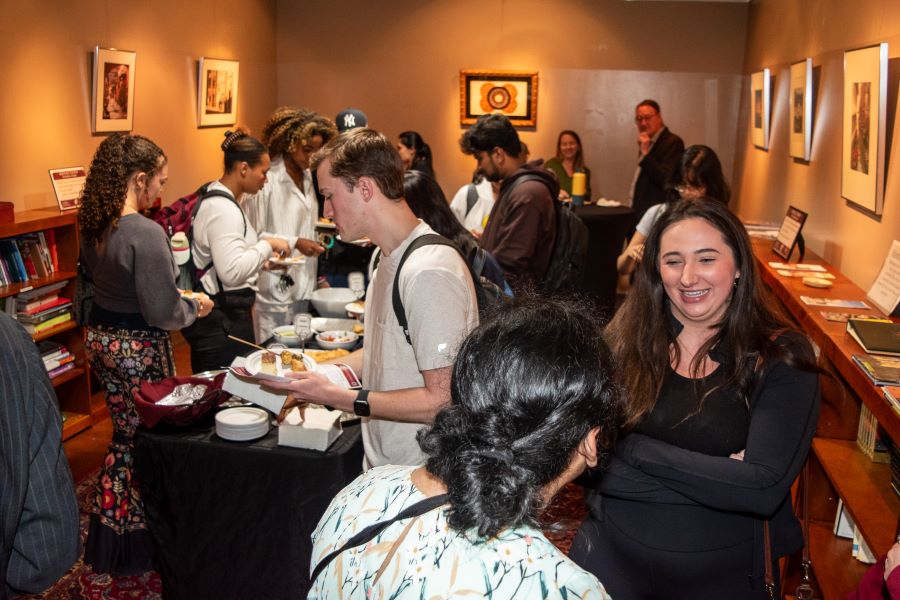
World Wide Fund for Nature (WWF) President Adil Najam emphasized the urgent need to tackle environmental degradation during the keynote address of the 10th annual South Asian Media and Cultural Studies (SAMCS) Conference on Friday, Feb. 2, at Florida State University.
The events were hosted by the College of Communication and Information at FSU along with the College of Social Sciences and Public Policy’s Ruth K. & Shepard Broad International Lecture Series and the Center for Global Engagement’s Engage Your World Speaker Series.
The SAMCS Conference is a leading global platform for researchers, academics and practitioners who actively contribute to the advancements of the media and cultural research, policies and practices in South Asia. This year’s conference theme, “Digital for Good,” focused on digital platforms being used as crucial tools to transform social, cultural and political interactions in the South Asian subregion.

In his keynote address, Najam discussed the environmental, financial, communication, global and health aspects of climate change. He proposed that “the age of adaptation fundamentally changes the nature of climate policy and politics. It introduces new challenges — and opportunities — to communicating.”
As the president of WWF International and professor of international relations and earth and environment at Boston University, Najam explained how climate change is a pressing and immediate challenge, especially for highly vulnerable countries — economically, politically and climatically. In arguing that we have now reached the age of adaptation, Najam said we must examine issues of climate and development from a global perspective instead of an international perspective.
“The climate is no longer a future issue — urgency has to turn into action,” he said.
His presentation resonated with the more than 100 students, faculty, staff and conference attendees in The Globe Auditorium.
“My academic background is research about activism through citizen journalism in the remote regions of India,” said Pooja Ichplani, FSU doctoral candidate. “Watching these talks, which presented similar initiatives in participatory media not just within India but also Bangladesh and Pakistan, makes me appreciative of the changing media landscape in the entire region. I am extremely grateful to learn about the research advances in South Asia and have the opportunity to network within and beyond FSU.”
“The SAMCS Conference provided a collaborative platform for scholars and practitioners to discuss the way forward to achieve a sustainable and inclusive future for South Asia,” said Steve McDowell, the John H. Phipps Professor of Communication and assistant provost for International Initiatives at FSU. “The theme changes each year as we try to address important questions.”
South Asia is the southern subregion of Asia, which is defined in both geographical and ethnic-cultural terms. The modern states of South Asia include Afghanistan, Bangladesh, Bhutan, India, Maldives, Nepal, Pakistan and Sri Lanka.
“Through collaborative efforts, we can bring leading voices like Adil Najam to illuminate the interconnectedness of the world’s challenges and the role that we play in crafting solutions.”
— Bryant Harden, program director of the Global Citizenship Certificate
The SAMCS Conference was held in partnership with the Department of Media Studies at CHRIST University, a deemed-to-be university in Bangalore, India.
The connection between FSU’s School of Communication and CHRIST University was built by Kailash Khoushik, an FSU alumnus who earned his Ph.D. in Media Studies from the School of Communication and is now an assistant professor at CHRIST University. Each year experts in South Asian media are encouraged to present at SAMCS and Media Meet, the Department of Media Studies at CHRIST University’s annual conference on media, culture and society.
“Something about the conference that I am most proud of is the commitment to offer a global platform that brings together scholars, practitioners and policymakers, without any registration cost,” said Vaibhav Diwanji, executive director of the SAMCS Conference and research assistant professor at the University of Kansas. “I am also very proud of the lifelong relationships I have developed with our speakers, presenters, and other dignitaries across the globe. I am honored and humbled to be a part of such an important initiative. Here’s to many more successful decades of the conference.”
The SAMCS conference kicked off with a virtual networking session where attendees were encouraged to share their work and meet fellow scholars in the field.
The program then consisted of four presentation panels, where speakers representing universities from around the world including countries like India, Pakistan, the United Arab Emirates, Germany and the United States spoke on the digital transformation of the South Asian mediascape, digital individuals, culture and data, digital knowledge and digital media for an inclusive and sustainable South Asia.
For more information about the SAMCS Conference, visit comm.cci.fsu.edu.



